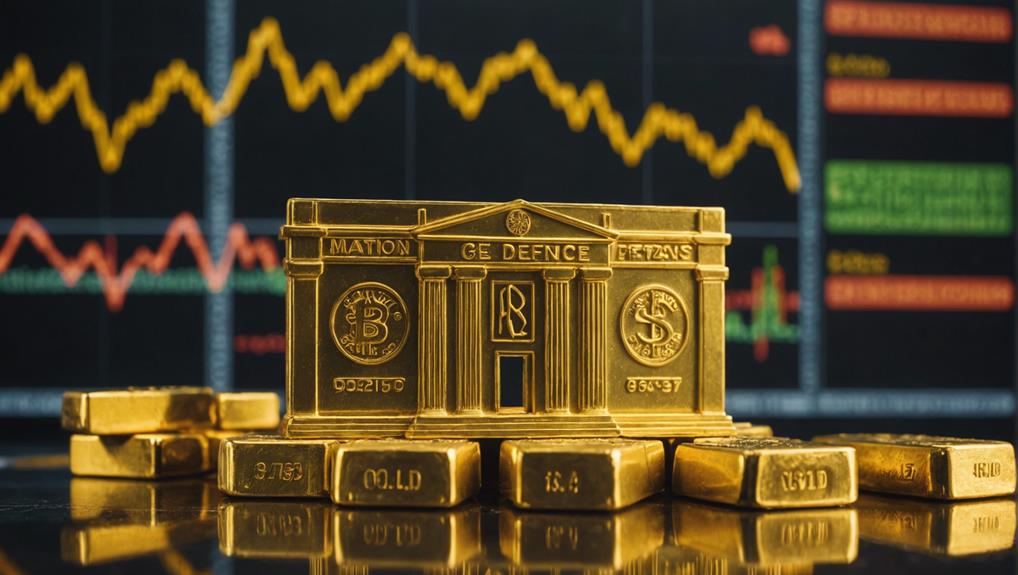Central bank policies, like setting interest rates and controlling the money supply, directly impact gold's appeal as an inflation hedge. When interest rates are low, borrowing costs decrease, encouraging spending and investment but potentially leading to inflation. This makes gold, with its ability to preserve purchasing power, more attractive. Conversely, higher rates can deter spending and slow inflation, reducing gold's allure. During times of economic uncertainty or inflation spikes, gold prices historically rise as it becomes a favored asset, securing its role in protecting value. Understanding this relationship can significantly shape your approach to safeguarding your financial future.
Understanding Central Bank Policies

Central bank policies directly influence your economic environment by regulating interest rates and controlling money supply. These tools are vital as they determine the cost of borrowing and the availability of currency, affecting everything from your mortgage rates to the strength of your currency.
When rates are low, borrowing is cheaper, potentially stimulating spending and investment but also possibly leading to inflation. Conversely, higher rates can curb inflation but may also slow economic growth.
Central banks also play a significant role in managing economic crises by adjusting policies to stabilize markets. Understanding these mechanisms is important, as they not only impact national economies but also influence global economic stability and your personal financial health.
Historical Gold Price Analysis

Analyzing historical gold prices shows how they've often surged during periods of high inflation and economic uncertainty. If you look back, you'll notice significant spikes during global crises.
For example, during the 1970s oil crisis, gold prices rocketed as currencies faltered. Likewise, the 2008 financial meltdown saw a sharp increase in gold investment, with prices peaking in 2011.
These trends suggest a pattern where gold becomes a go-to asset when confidence in traditional investments wanes. It's not merely about the raw numbers; it's about understanding the context behind these jumps. Each spike tells a story of global economic shifts, making gold not only a commodity but also a reflection of historical economic sentiments.
Gold's Role as an Inflation Hedge

Gold serves as a crucial inflation hedge, preserving your purchasing power during times of currency devaluation. When you think about inflation, consider it as the rate at which the general level of prices for goods and services rises, eroding the money's value. Historically, gold has maintained its value over the long term. Its price tends to rise when inflation takes hold, as you and other investors look for safe assets that won't lose value.
Unlike paper currency, gold can't be printed or digitally created, limiting its supply and helping it retain value. It's imperative, though, not to see it solely as an investment for returns but as a protective tool against the gradual loss of currency value.
Central Banks and Market Impact

While you focus on the stability of gold, it's crucial to understand how central banks influence market dynamics through their monetary policies. Central banks play a pivotal role in shaping the economic environment that directly impacts the gold market. Here's how:
- Interest Rate Adjustments: When central banks modify interest rates, it affects investment returns on bonds and equities. Lower rates generally make gold more attractive as it doesn't offer yield.
- Quantitative Easing: By increasing the money supply, central banks can devalue the currency, making gold, which is seen as a stable asset, more appealing.
- Inflation Targeting: Efforts to control inflation can sway investor confidence in gold as a hedge against currency devaluation.
Investor Behavior and Gold

When you investigate gold as an investment, you'll find that trends in demand significantly influence its value.
It's essential to understand how psychological factors shape investor decisions, especially in times of economic uncertainty.
These elements combine to affect the overall market perception and pricing of gold, making it a unique asset in financial portfolios.
Gold Demand Trends
Investors often turn to gold during times of economic uncertainty to protect their wealth. As you investigate investment strategies, it's essential to understand the current trends in gold demand which significantly influence its price and viability as an investment.
Here are three significant trends:
- Increased Buying by Central Banks: Many central banks have ramped up their gold reserves, seeking stability against fluctuating fiat currencies.
- Growth in Gold ETFs: Investments in gold-backed ETFs have surged, providing easier access for you to invest in gold without physical ownership challenges.
- Rising Consumer Demand in Emerging Markets: Countries like China and India have seen a substantial increase in consumer demand for gold, driven by both cultural affinity and economic growth.
Psychological Impact on Choices
Understanding your own psychological drivers can significantly affect your decision to invest in gold during uncertain economic times. Gold often represents a psychological safe haven when you're wary of volatile markets or fear inflation. It's not only about the tangible value; it's how secure it makes you feel.
You might lean towards gold when central banks implement confusing policies or when the economic outlook feels unstable. This gravitation isn't simply pragmatic; it's deeply rooted in the human psyche's need for safety in the midst of uncertainty.
Recognizing these emotional cues can empower you to make more balanced investment decisions, ensuring you're not merely reacting out of fear but strategizing with a clear, informed perspective.
Future Outlook on Gold and Policies

Looking ahead, central bank policies are likely to continue influencing gold's role as a hedge against inflation. As you manage your investment strategies, it's essential to understand how these dynamics might play out in the coming years.
- Interest Rate Adjustments: Central banks might adjust interest rates in response to economic indicators, which can affect gold prices directly. Lower rates generally make gold more attractive as it doesn't yield interest.
- Quantitative Easing Measures: Continued or new quantitative easing programs can devalue the currency, making gold a more appealing investment as it retains value.
- Geopolitical Stability: Changes in geopolitical climate often drive investors towards gold. Keep an eye on global events that could shift central bank policies unexpectedly.
Conclusion
Central bank policies profoundly impact gold's role as a reliable hedge against inflation. As these institutions manipulate economic measures, gold historically climbs in value during periods of high inflation, serving as a financial safeguard for investors. Understanding this relationship is crucial for predicting market trends and shaping your investment strategy. Be attentive to shifts in policy—they will significantly dictate the landscape of investing.
It's hard to ignore the sense that banks, often seen as allies of the wealthy, don't always have the average investor's best interests at heart. Their complex structures and policies, influenced by politicians and monetary systems that I find increasingly hard to trust, lead me to seek more control over my financial destiny. Gold offers that control, standing out as a tangible asset free from the whims of these institutions.
It's clear that in the vast ocean of financial options, gold remains a steadfast ship for those of us wanting more direct command over our investments. Don't just take my word for it; empower yourself. Request your free gold information kit today and start navigating through these turbulent financial waters with confidence.
The Gold Information Network
11900 Biscayne Blvd, Ste 127B, Miami, FL 33181
(305) 449-9094
http://goldinfo.net







